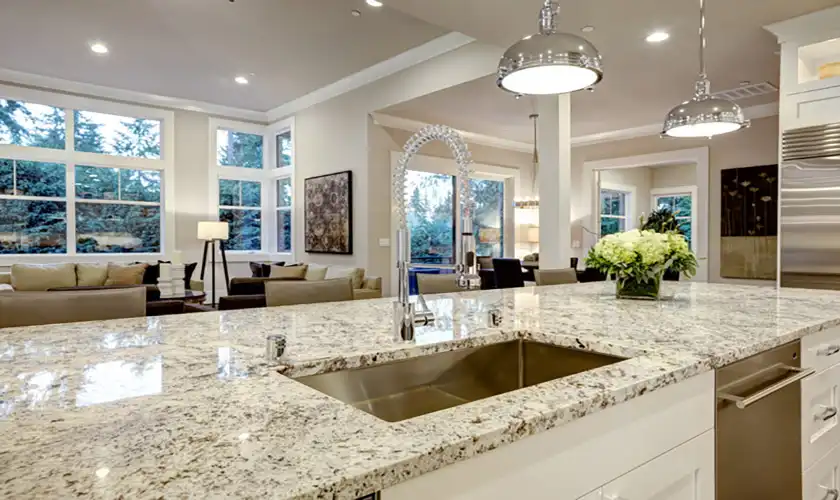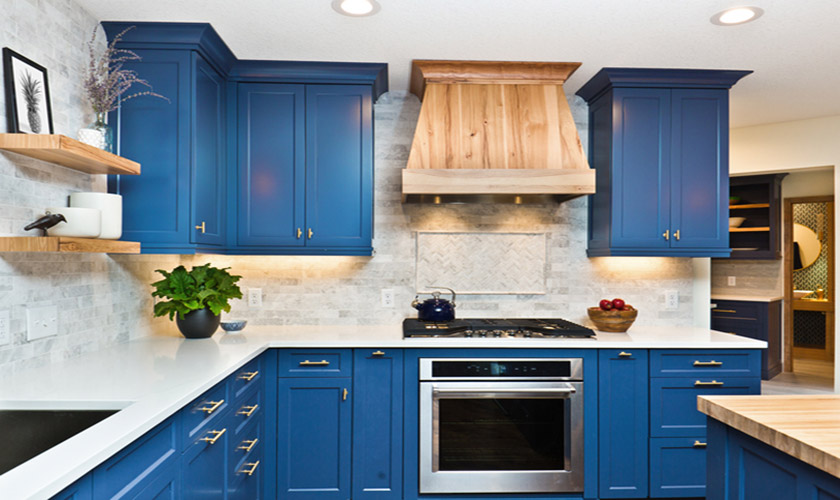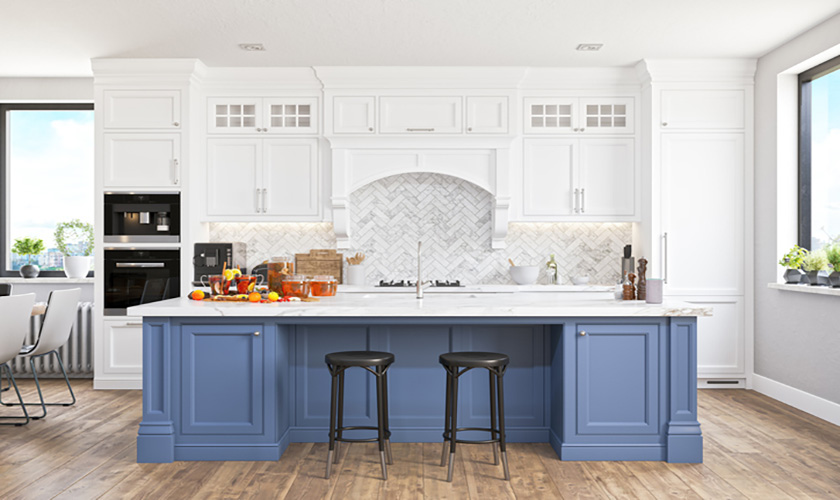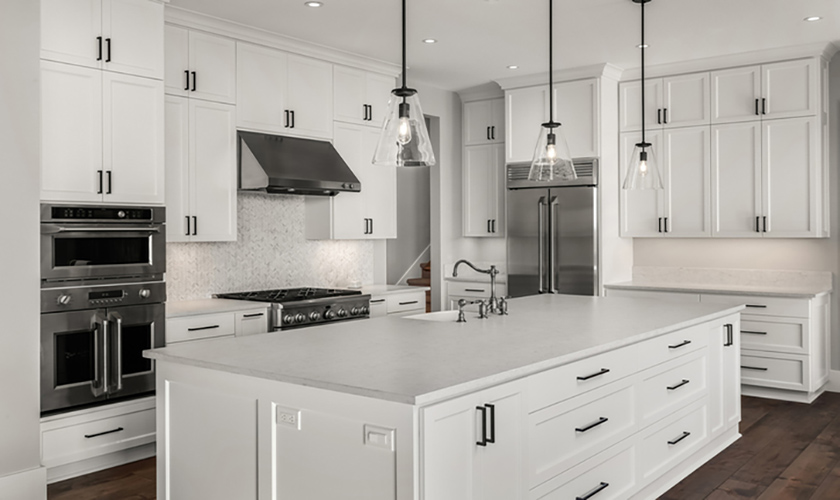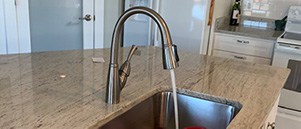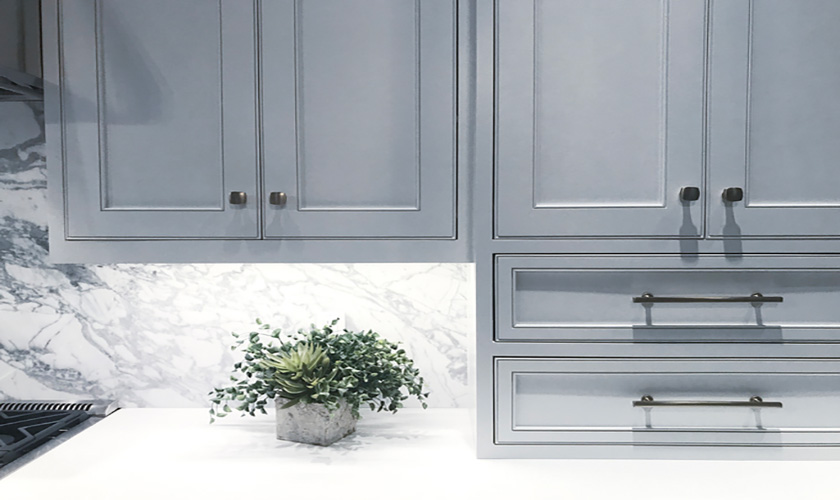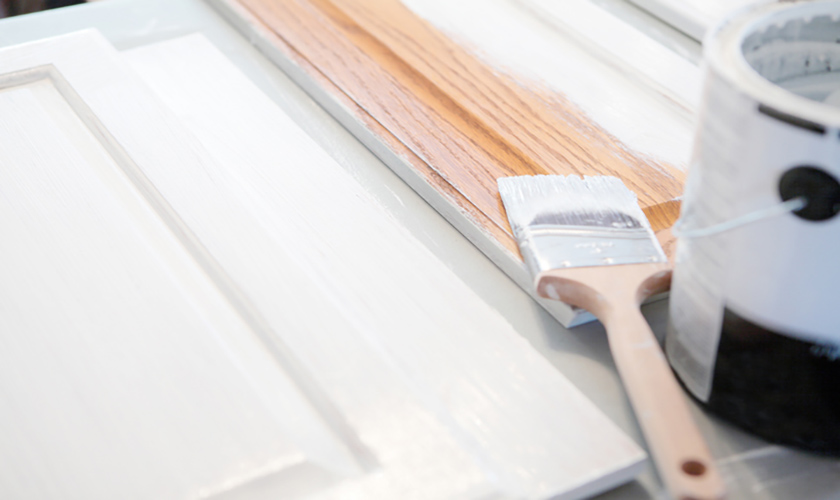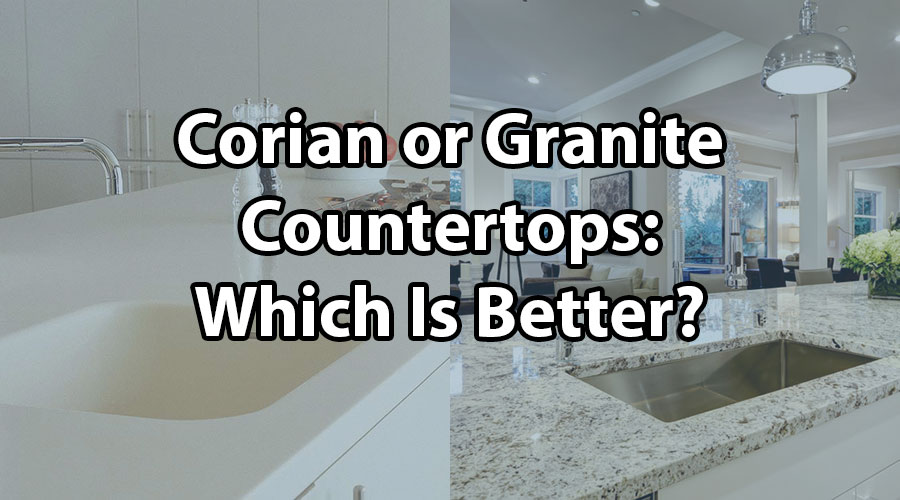
Are you looking for new granite, quartz, Corian, and wood countertops? If so we can help. Get FREE quotes for local countertop installers. All contractors are licensed, screened, and insured.
With so many countertop materials on the market, many homeowners find it challenging to choose the right one. You should consider utility, your particular design style, and your needs for longevity, ease of maintenance, budgeting, and upkeep.
Why Granite Countertops?
Granite is one of the extensively outstanding options whenever it gets to customary stone countertops.
It’s an ordinary preference among homeowners because it’s glamorous and long-lasting. Granite countertops are a popular choice amongst all countertop selections.
Granite exists in many native hues and designs, and you can’t accurately determine whatever color selection you want since it’s a natural stone. Of course, you can request some natural shades and patterns of this natural stone, but each granite slab is distinct and cannot be modified.
Granite costs vary from inexpensive to extremely costly, based mainly on thickness. The thicker the granite cut is, the more money you’ll have to spend.
Why Corian Countertops?
DuPont designs Corian countertops and other residential surfaces. Corian is also an excellent choice for kitchen and bathroom countertops like granite. Ensure you evaluate the benefits and drawbacks of Corian countertops before you make up your mind to acquire the material.
You can mold Corian counters’ edges into ridges of unimaginable designs with a natural stone look. Because you can sculpt it, you can form elastic arcs, twirls, and lateral forms, making Corian ideal for ultra-modern kitchen designs. Even the sinks are molded so no water can leak around it like with surface-mount or under-mount sinks.
Corian vs. Granite: How They Differ
Granite and Corian worktops vary in several ways, starting with their roots. The difference is that Granite is a natural product harvested from the earth. At the same time, Corian is a trademark solid surface material you apply for a durable synthetic material veneer formulated by DuPont Co.
Evaluate the outlines of these two countertops, including sturdiness, visual value, and usefulness, to see which one is ideal for your house and lifestyle.
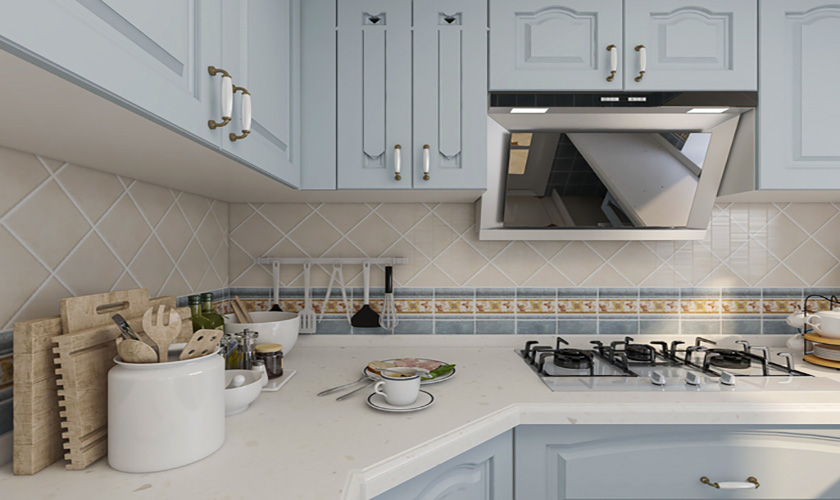
Corian Provides Nonporous Countertop Surfaces
Corian can be a solid color but often has slight shadings that simulate some natural stones. Still, most approaches are far less stunning than the specific mosaic and color shifts of naturally occurring Granite.
Corian solid surface tops are commonly found in kitchens, but the more homogeneous aspect can be advantageous in other areas like offices, bathrooms, or workshops.
When you want beautiful cabinets to be the focal point, Corian can be the perfect complement.
Corian is perfect for bathrooms because the solid surface is nonporous, meaning it won’t absorb liquids.
Granite, while popular for kitchens, is a porous natural stone and needs a sealant at least once a year to avoid absorbing liquids that can harm or stain the appearance. Avoid cutting raw meat on unsealed granite as well.
Granite Provides the Beauty of Natural Stone
Granite worktops are renowned for their stunning decorative and natural minerals embedded in the stone.
Each natural product is unique, with no two stone slabs the same. In contrast to solid-surface materials, Granite has a one-of-a-kind appearance.
These counters are eye-catching with a unique combination of minerals that Corian can’t mimic. Shades can vary from the lightest white to the darkest black, with a considerable variation between copper shades.
If you’re prepared to spend a bounty to have a countertop piece put together, brilliant blue, yellow, and red granites are attainable.
Whenever it refers to aesthetics, it’s a question of personal preference, but several people choose Granite’s inherent beauty over the polished look of the fine veneer.
Is Corian or Granite Easier To Maintain?
Corian worktops are extremely simple to clean and maintain. This is one of the most critical factors that add to the appeal of the surfaces. To clean your Corian surfaces, use moderate water with soap.
Never apply an aggressive cleanser on a Corian countertop, as it can harm the surfaces. This countertop does not need sealing because it is non-porous. It does not soak in any substance that spills on it.
Granite is one of the considerably low-maintenance simple pebble countertop alternatives. Easy-to-use cleaning supplies are accessible to assist you in thoroughly maintaining the surface.
On average, you’ll only need to reseal your granite worktops once a year. Some granites, on the other hand, require additional periodic sealing. This isn’t a problem because sealing is an easy and rapid operation. Granite is resistant to a variety of hazards found in kitchens and baths.
Both coverings are fairly simple to maintain in terms of upkeep. Nevertheless, considering all of Granite’s other benefits, its ease of care makes it even more appealing.
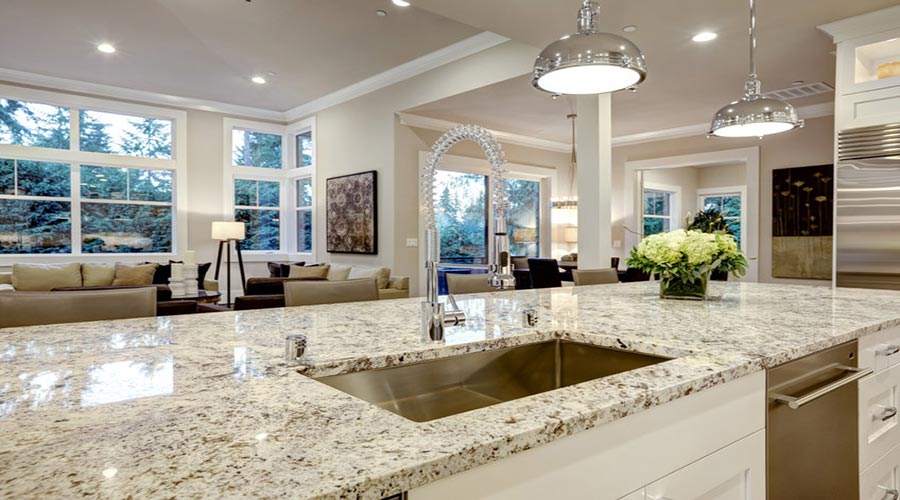
Does Corian Cost More Than Granite?
Corian counters cost roughly $40 per square foot when enlisted. Granite can cost $120 per square foot, making Granite more expensive than Corian. Even to that extent, granite, of course – is costly for a reason.
The texture amounts to $35 or more per sq foot when obtained in paper layout, and the expense of the tar stick used to associate creases.
Granite countertops are sometimes bought as packages that incorporate materials and work. Corian vs. granite cost comparisons are as per the following:
- $40 to $100 per sq foot for the granite chunk
- The project worker normally ascertains the work cost of $35 to $85 per hr.
The cost of granite varies based on the stone’s grade, breadth, and color palette. The final pricing may include placement of the counter and surface coating for protection.
Because you must reseal Granite regularly, there may be total charges over the commodity’s lifespan. And this raises the overall countertop expense.
Corian is the least expensive of the two, making it a viable choice for budget-conscious homeowners or less critical lower-level rooms like basement baths or laundry rooms.
See our full Corian vs Granite Cost Comparison Guide.
Is Corian as Durable as Granite?
Granite is scratch-resistant, which means you can use it to chop food without a chopping board. Its heat resistance is especially noteworthy since you may comfortably put a skillet or saucepan directly off the burner or oven on top of it.
Granite tops are not impervious to damage. Excessive exposure to acidic cleaners makes granite stains impossible to remove. Acidified materials like vinegar and lemon juice will discolor it. Thus it must be resealed each 6 to 12 months to stay stain-free. Even worse, they can be susceptible to flaking and shattering over time.
As opposed to Granite, Corian does not need a sealant. Spraying chemical cleaners directly on Corian won’t harm it. You risk chipping or scratching the surface if you slice or chop food directly on top without a cutting board. You can buff away minor scratches with a buffing block or scouring pad.
If you place something hot off the stove on top of Corian counters, you must use hot pads and trivets. Temperatures above 325° F can cause permanent damage to the surface. Corian surfaces will warp and disintegrate if exposed to high temperatures over a longer length of time.
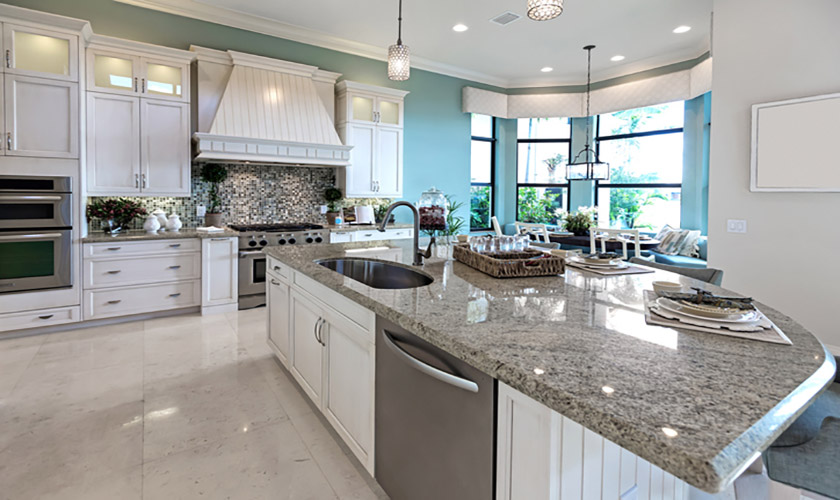
Does Corian or Granite Tolerate Heat Better?
Corian materials are unable to tolerate anything hot. So avoid placing a hot pot on Corian. However, the good news is that you can sand and polish area minor damage with fine sandpaper or a scouring pad.
However, permanent damage will prove challenging to remove from Corian solid-surface countertops.
You can use Ammonia-based cleaners or soapy water to clean the countertop. Glass cleaners leave a sticky residue on the surface, so avoiding them would be beneficial.
You could use hot pads to protect your Corian surface. Watch out for kitchen gadgets that produce heat, such as ceramic pots and electrical skillets.
While Granite surfaces can resist high temperatures without it being ruined, there have been instances in which the granite substance has broken due to high temperature, but this is rare.
Using vinegar, glass cleaners, and other alkaline materials to clean your granite counter might cause flaking, so try soapy water. They make the surface hazy or cloudy. The effective way to accomplish a clear, polished stone surface would be to use sodium carbonate.
Corian vs. Granite: Which Resists Scratching Better?
Corian surfaces are not highly durable or scratch-resistant, and you should never use sharp things, such as cutlery, on them. Ensure you have a cutting board in place during meal preparation.
Slicing or chopping vegetables on Corian causes minor scratches that are unsightly and repeatedly need repair, which is costly and time-consuming.
On the other hand, Granite elements are relatively durable, and you may use sharp items on them without scraping because stone production employs extremely durable techniques.
However, Granite dampens your blades quickly, so you should use a cutting board to avoid having to replace them.
Corian vs. Granite: Which Resists Stains Better?
Corian materials are made of acrylic components. They are non-porous and stain repellent. Nevertheless, acidic meals can taint your worktop if left to soak for a long time.
You could remove the smudges on your countertop to purify the surface using soapy liquid, ammonia, bleach, or alcohol. Avoid abrasive cleaners because they cause rubs on your countertop.
Granite can catch stains from any colored food material. The worst stains are oil stains. The stains may never come out when allowed to sit for too long.
As for granite materials, the most promising means to tidy them is by employing warm soapy water every day. You should use a sterile water antidote and isopropyl alcohol mix at a 50/50 percentage weekly. Ensure that you always keep a sprinkle urn with a premixed solvent handy.
Here is how you do it you remove stains from granite:
- Sprinkle the mixture on the counter and wait for it to settle for about three minutes;
- Wipe it off using a clean, absorbent cloth.
- When wiping off the solution, use microfiber cloths to give your surface a clean wash-off.
- Ensure that the surface is dry since Granite is porous. You do this to avoid the stone soaking in any liquid.
Avoid using vinegar, bleach, or any substance that contains ammonia. When you use acidic materials they penetrate the stone and, over time, cause permanent damage reducing the life of your stunning granite countertop.
Corian vs. Granite: Which has Better Resell Value
Replacing your countertops is a widespread way to improve the significance of your home. This can be useful when it comes time to sell your house. Despite this, not all counters can increase the value of a home.
Despite their many advantages, Corian countertops will not increase the value of your residence. While the covering may enrich the aesthetic of your home, it has no financial implications.
On the other hand, Granite has a substantial comparative value in aesthetic appeal and resale value. You may be able to reclaim part of the cost of your granite countertops when you list your home.
Granite will provide you with a higher economic return than Corian. Granite countertops are one of the extensively cost-effective upgrades you can make to your home.
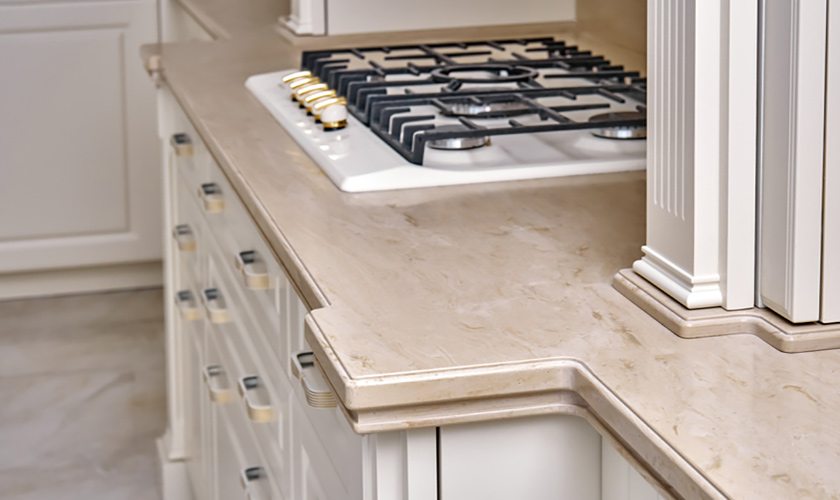
Corian vs. Granite: Seams and Sealants
An expert manufacturer can diminish the noticeable creases on a granite counter to make them less clear, yet a natural granite slab doesn’t look consistent.
A Corian counter, on the other hand, is seamless. The seams of a Corian counter are edged and glossy to make it look like a single surface, giving it its sleek appearance.
Since most granite structures are porous, a sealer must be fitted regularly to monitor unpleasant holes.
Corian vs. Granite: Setup Procedural Ease
Skilled installation is necessary for both Granite and Corian countertops. Corian is easy to transport and install. However, Granite is much more complicated to install, and it is recommended to ask for professional help.
Resellers provide homeowners with whole and half chunks. You can use a typical circular saw to cut Corian and a RotoZip or router to make sink cutouts. Corian is positioned with seaming components ideally designed for the countertop, eradicating any noticeable layers.
Even with a skilled installer, a clear coating is needed for Granite to mask the color contention of each piece.
Lifespan
Corian has a 10-year warranty, but they can easily last 30 years or more. These counters may need to be renovated because of scratches and burns and when you wish to update the layout.
Granite is among the most reliable elements conceivable, with 50-year life expectancies. Granite countertops have a long lifespan.
Corian vs. Granite: Which Is Better?
Installing a granite countertop in your kitchen will make your home more valuable. It is a selected option among householders due to its raw elegance and strength.
However, keep in mind that it will need additional maintenance. Because it’s porous, it is crucial to seal cracks and gaps with clear silicone annually to avoid bacterial multiplication and damage.
Corian is also a more flexible and practical choice. When compared to Granite, it needs less upkeep. Corian is big enough to withstand daily culinary use, even though it isn’t as long-lasting as Granite.
It offers many layouts and is easier to use. Corian is the most excellent choice if you want a customizable material.
Final Thoughts
It all depends on your budget, how much maintenance you can deal with, the design you want to accomplish, and the level of customization you need. Only you can choose which countertop material is favorable for your kitchen.
So is Corian better than Granite? Fortunately, Granite takes this one. It may be expensive, but it will last you a lifetime, and it has more pros than Corian.
Are you looking for new granite, quartz, Corian, and wood countertops? If so we can help. Get FREE quotes for local countertop installers. All contractors are licensed, screened, and insured.


